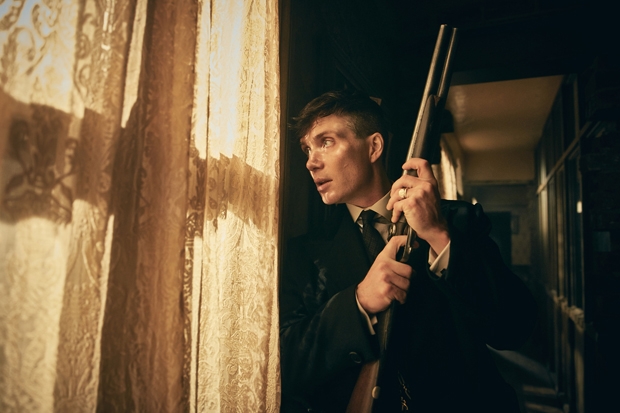The big returning show of the week began with servants laying out the silverware at a large country house in 1924. But rather than a shock comeback for Downton Abbey, this was — perhaps even more unexpectedly — Tommy Shelby’s new home in Peaky Blinders (BBC2, Thursday). Which explains why so many of the guests were carrying guns, and why the family matriarch was using the word ‘fuck’ a lot more than Lady Grantham ever did.
When we last saw gang-leader Tommy (Cillian Murphy), he was still based in the Birmingham backstreets. He was also having a fairly tough time — what with juggling two women, trying not to get murdered and being required by the government to start the Irish Civil War. Two years on, however, things are clearly looking up. Not only is he living in squirearchical splendour, but on Thursday we joined him on his wedding day.
After an extended tease of the audience, the bride was revealed to be Grace, the former police informer, whose husband had, it seems, conveniently committed suicide while we were away. The marriage service was performed by Jeremiah Jesus, the dreadlocked black street preacher who’d somehow metamorphosed into a Catholic priest for the occasion.
At first, it sounded as if the celebrations that followed wouldn’t be much fun, with Tommy insisting on a strict policy of no cocaine, gambling or fighting. Fortunately, these rules were soon broken, although, in Tommy’s defence, he did have other things on his mind. Despite his wealth, he’s still in thrall to the biggest gang of them all: the British establishment, led by the shadowy Mr Big otherwise known as Winston Churchill.
This time, Tommy’s job is to supply arms to the White Russians. As a result, he had to break off from partying to receive a huge bundle of cash from a glamorous Georgian duchess and to order the killing of a Bolshevik spy disguised as one of the guests. ‘It wasn’t the day I was expecting,’ his new wife told him when they finally retired for the night.
Now, you may think none of this sounds terrifically believable — but, as well as being true, that would surely be beside the point. Peaky Blinders has never been a work of stark realism. Nor (although I’m less confident about this bit) was it ever intended to be. Like The Night Manager, the show mightn’t be as classy as it thinks, lacking as it does such qualities as psychological depth and narrative plausibility. Yet, like The Night Manager, too, it’s hard for even the sternest Leavisite critic to resist: a highly efficient piece of entertainment, full of inventive storytelling and heroically unafraid to go over the top when necessary — which is apparently quite often. In short, it’s good to have the old gang back together again.
Last week, Grayson Perry caused some handy outrage in advance of his new series by attacking blokes in general and poor old Bear Grylls in particular for hanging on to an outmoded model of manhood. Once the programme itself began, though, Grayson Perry: All Man (Channel 4, Thursday) gradually proved much more nuanced than that.
Admittedly, Perry’s basic thesis won’t have startled many viewers: that, with the disappearance of heavy industry, the old ideals of masculinity need to be changed; and that, instead of being strong and stoical providers, men should — you guessed it — talk about their feelings more. (Presumably, that is, as long as those feelings are deemed acceptable.) But while Perry did his best to keep this idea going, it was regularly undermined by his obvious soft spot for strong and stoical providers; and above all by his winning tendency to be properly interested in — and to really like — the people he meets.
On the grounds that extreme examples of masculinity are the best way of exploring the subject (as opposed to, say, the best way of ensuring some newsworthy telly), Perry began on Thursday with cage fighters in the north-east. To the great benefit of the programme — if not of his thesis — they turned out to be rather a thoughtful bunch, happy to acknowledge that their machismo contained strong elements of impersonation and wish fulfilment.
Of course, there are logical reasons why Perry didn’t speak to many buttoned-up types: they’re probably too buttoned-up, for a start. Nonetheless, it did seem odd that so much of the programme should consist of men articulately expressing their feelings about men’s failure to express their feelings articulately.
Still, if the programme ended up undeniably confused, that might be no bad thing. After all, as male responses to the conflicting demands made on them go, confusion feels like a pretty sensible one to me — and ultimately far more illuminating than the banal certainties that we looked to be in for when Perry began.






Comments